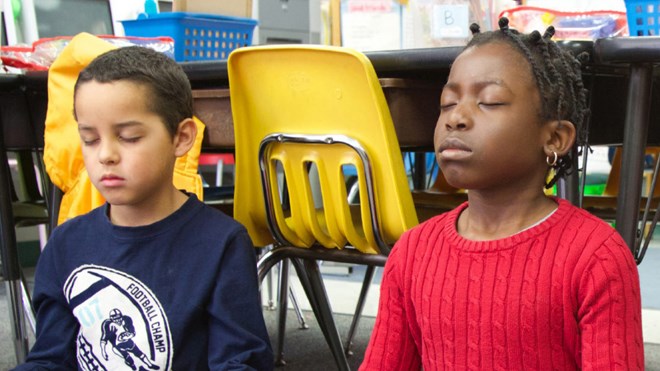The Sudbury and District Health Unit (SDHU) is preparing to enter the second phase of a pilot program that looks to instill mindfulness in school children.
Taking a page from Buddhist philosophy, mindfulness is a pyschological technique that seeks to focus one's attention on the present moment, examining thoughts and feelings without judgment. The popularity of mindfulness as a technique has gained popularity in recent years.
The health unit sees the potential value the technique can have in helping students manage in-class stress (like being ready for that big test), make better decisions and focus on assignments.
The pilot is a partnership between the health unit's school health promotion team and a local school board. Public health nurses delivered weekly activities for 15 weeks in classrooms between January and June 2017, working with teachers and 70 students in grades seven and eight.
Lessons were a mix of knowledge and hands-on activity and included two components: attention skills and heartfulness skills, with teachers expected to build on the lessons and continue role modeling and integrating the activities and strategies.
"This pilot project is a component of the school health promotion team's overall goal of creating resilient schools," said Stacey Gilbeau, manager, health promotion division at SDHU during a presentation at an SDHU board meeting on Oct. 19.
"What is the connection between mindfulness and resiliency? Mindfulness is a strength-based tool that adds value and enhances the effects of other resiliency programs. By targetting emotional regulation, attention, and self-awareness, students have the skills required to think clearly enough to choose a health-promoting strategy that they learn."
Under the SDHU's requirements of public health standards, they are expected to support school boards and schools with the implementation of health-related curriculum related to mental health promotion.
"Increased mindfulness can help students cope with stress and adversity and increase their critical-thinking skills and decision-making abilities," said Gilbeau.
"These skills are key for students to be able to make well-informed choices, including choices related to health promoting and risk-taking behaviours which can lead to overall student well-being."
Student health and well-being has taken a top priority with the Ministry of Education, according to Gilbeau.
So how does the program work, and how is mindfulness taught?
Public health nurses trained in mindful schools are invited into classrooms and use their time to teach lessons from the mindful schools curriculum. The development of mindfulness is a moment-by-moment awareness of one's own thoughts, emotions, sensations and surrounding environment.
The classroom teachers then learn the lessons themselves and integrates them into their subsequent classes.
"There is a ripple effect of mindfulness; teachers who embody mindfulness create supportive classrooms and the whole school environment for students, welcoming wellness and pro-social behaviours that are essential for education and public health outcomes," said Gilbeau.
The 15-week pilot was implemented for students in grades seven and eight and in phase two it will be expanded to include students in Grade 9. According to Gilbeau, this transitional age group is one that sees the most positive impacts from the program.
"After the pilot project we found that students had an increase in mindfulness," said Joelle Martel, health promotion division, SDHU. "Students also reported that using mindfulness techniques helped them to calm down before a test or presentation, to better concentrate in class, to calm down when they were feeling frustrated or upset, and to be more positive and happy at school."
Martel said that these preliminary results show early indications that students are better able to manage their emotions and have increased their skills for coping with stress.
"These healthy coping strategies are transferable skills that can be used when making informed decisions," said Martel.
"The pilot project yielded positive feedback from both participating teachers and both recommended that the program continue into the next school year and that more staff and students participate."
Phase two will be a 16-week pilot that is expected to start in the coming weeks.
